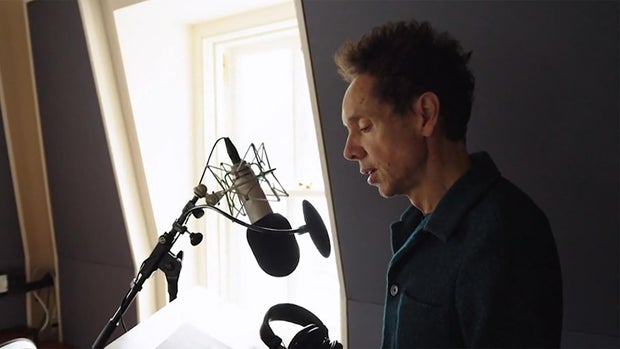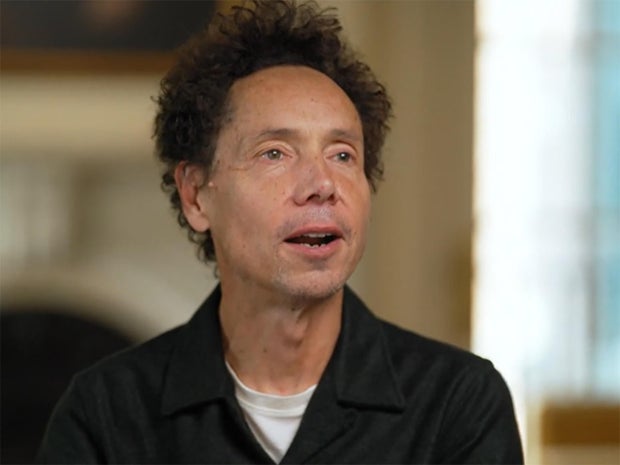CBS News
Man who used megaphone to lead attack on Capitol police sentenced to more than 7 years in prison

A Washington state man who used a megaphone to orchestrate a mob’s attack on police officers guarding the U.S. Capitol during the Jan. 6, 2021, riot was sentenced on Wednesday to more than seven years in prison.
U.S. District Judge Royce Lamberth said videos captured Taylor James Johnatakis playing a leadership role during the Jan. 6 attack. Johnatakis led other rioters on a charge against a police line, “barked commands” over his megaphone and shouted step-by-step directions for overpowering officers, the judge said.
“In any angry mob, there are leaders and there are followers. Mr. Johnatakis was a leader. He knew what he was doing that day,” the judge said before sentencing him to seven years and three months behind bars.
Department of Justice via AP
Johnatakis, who represented himself with an attorney on standby, has repeatedly expressed rhetoric that appears to be inspired by the anti-government ” sovereign citizen ” movement. He asked the judge questions at his sentencing, including, “Does the record reflect that I repent in my sins?”
Lamberth, who referred to some of Johnatakis’ words as “gobbledygook,” said, “I’m not answering questions here.”
Prosecutors recommended a nine-year prison sentence for Johnatakis, a self-employed installer of septic systems.
“Johnatakis was not just any rioter; he led, organized, and encouraged the assault of officers at the U.S. Capitol on January 6,” prosecutors wrote in a court filing.
A jury convicted him of felony charges after a trial last year in Washington, D.C.
Johnatakis, 40, of Kingston, Washington, had a megaphone strapped to his back when he marched to the Capitol from then-President Donald Trump’s “Stop the Steal” rally near the White House on Jan. 6.
“It’s over,” he shouted at the crowd of Trump supporters. “Michael Pence has voted against the president. We are down to the nuclear option.”
Johnatakis was one of the first rioters to chase a group of police officers who were retreating up stairs outside the Capitol. He shouted and gestured for other rioters to “pack it in” and prepare to attack.
Johnatakis shouted “Go!” before he and other rioters shoved a metal barricade into a line of police officers. He also grabbed an officer’s arm.
“The crime is complete,” Johnatakis posted on social media several hours after he left the Capitol.
He was arrested in February 2021. He has been jailed since November 2023, when jurors convicted him of seven counts, including obstruction of the Jan. 6 joint session of Congress that certified Joe Biden’s 2020 electoral victory. The jury also convicted him of assault and civil disorder charges.
Justice Department prosecutor Courtney Howard said Johnatakis hasn’t expressed any sincere remorse or accepted responsibility for his crimes on Jan. 6.
“He’s going so far as to portray himself as a persecuted victim,” she said.
Lamberth said he received over 20 letters from Johnatakis, his relatives and friends. Some of his supporters don’t seem to know the full extent of his crimes on Jan. 6, the judge said. Lamberth said he would order the clerk of court’s office to send all of them copies of his prepared remarks during the sentencing hearing.
“There can be no room in our country for this sort of political violence,” Lamberth said.
Last April, Lamberth ordered a psychologist to examine Johnatakis and determine if he was mentally competent to stand trial. The judge ultimately ruled that Johnatakis could understand the proceedings and assist in his defense.
Approximately 1,350 people have been charged with Capitol riot-related federal crimes. Over 800 of them have been sentenced, with roughly two-thirds getting terms of imprisonment ranging from several days to 22 years.
CBS News
New Zealand reclaims world record for largest mass haka

New Zealand on Sunday reclaimed the world record for the largest mass haka after more than 6,000 people performed the legendary Maori war dance, dethroning France.
The record was broken in deafening fashion at Eden Park rugby stadium in Auckland, where thousands of men, women and children combined on the pitch to complete the traditional native challenge involving vigorous movements, stamping feet and rhythmic shouting.
An adjudicator confirmed that 6,531 participants had performed the ‘Ka Mate’ haka, a rendition made famous by the All Blacks rugby team, who perform it immediately before Test matches.
France had held the world record since September 2014 when 4,028 people slapped their thighs and bellowed the chant following a rugby match in France Brive-la-Gaillarde, southwestern France.
Auckland organizers had hoped for up to 10,000 participants but were nevertheless pleased the record had been reclaimed by New Zealand, where the haka is regarded as a national treasure.
“We want to bring the mana (pride) of the haka back home,” Michael Mizrahi, director of the Auckland attempt, told AFP. “It’s not just that we want to take it off the French, it’s like a national treasure that somebody has taken from us. It’s got enormous meaning for us as New Zealanders.”
He added: “Some things should be culturally sacred.”
DJ MILLS/AFP via Getty Images
Previous attempts involving crowds of more than 5,000 on New Zealand soil failed because Guinness World Records officials didn’t ratify them, Mizrahi said.
This time around, an adjudicator was flown to Auckland.
The Ka Mate haka was composed around 1820 by the warrior chief Te Rauparaha to celebrate his escape from a rival tribe’s pursuing war party.
Under New Zealand law, a Maori tribe, the Ngati Toa, based in Porirua just outside Wellington – are recognized as the cultural guardians of the Ka Mate haka.
CBS News
Malcolm Gladwell on “Revenge of the Tipping Point”

Watch CBS News
Be the first to know
Get browser notifications for breaking news, live events, and exclusive reporting.
CBS News
Malcolm Gladwell’s life has changed; he has not

On Tuesday, a new Malcolm Gladwell book comes out. And if history is any guide, it will be a bestseller. “They’re stories about ideas,” he said. “They have characters. They have plots. I’m usually trying to say something about the world.”
His first book, “The Tipping Point,” published in 2000, established the Gladwell recipe: he explores a theme through anecdotes and little-known scientific studies. “‘Tipping Point’ was about the epidemic as an incredibly useful way of understanding how ideas move through society,” Gladwell said. “And epidemics have rules. Let’s learn the rules, right?”
His seven New York Times bestsellers have sold 23 million copies in North America alone. His fee for corporate speeches is $350,000. His fans have downloaded a quarter-billion episodes of his podcast, “Revisionist History,” and he founded a company called Pushkin Industries to produce it.
CBS News
In other words, Gladwell has come a long way from the small Canadian town where he grew up, son of a British father and a Jamaican mother, whom he describes as “subversive,” someone who would write notes to excuse her son from class with a blank space. “I would just fill out the date,” said the man who skipped a lot of school.
He attended the University of Toronto, but his best education was the ten years he worked for the Washington Post. “I knew nothing about newspapers,” he said. “I was so raw. I was 23, I think, or 24. Bob Woodward was two rows away from me. I learned at the feet of the greatest journalists of my generation.”
In 1996, Gladwell joined The New Yorker. He wrote about why, in the 1990s, New York’s crime rate plummeted in an article called, “The Tipping Point.” A book followed. It introduced a recurring Gladwellian theme: hidden patterns in the way the world works.
He’s a world-class contrarian, about college (“You should never go to the best institution you get into, never; go to your second or your third choice. Go to the place where you’re guaranteed to be in the top part of your class”); about working from home (“It’s not in your best interest to work at home. … If you’re just sitting in your pajamas in your bedroom, is that the work life you want to live, right? Don’t you want to feel part of something?”); about football (“I think the sport is a moral abomination”).
Gladwell says he enjoys being provocative: “Of course!” he said. “I like poking the bear. I mean, journalists should poke the bear.”
CBS News
Gladwell’s fans love his storytelling, and the A-ha! moments they bring. His critics, on the other hand, have described his writing as “generalizations that are banal, obtuse, or flat wrong,” and “simple, vacuous truths [dressed] up with flowery language.” “I’m with the idea that not everyone’s gonna like my work,” Gladwell said. “100% of people don’t like anything.”
In a 2021 “Sunday Morning” interview, Gladwell said, “I would rather be interesting than correct.” He called that “an overly provocative way of saying things! No, I think what I meant was, if I turn out not to be right, I’m not devastated. I accept that as the price of doing business.”
Gladwell often turns his mistakes into new chapters or podcast episodes. In “The Tipping Point,” he explained that New York’s crime drop was the result of “broken windows policing.” As he described it, “Little crimes were tipping points for big crimes.” But that philosophy led to New York’s policy of “stop and frisk.”
“Doing 700,000 police stops a year of young Black and Hispanic men is deeply problematic,” Gladwell said. “We were wrong. I was part of that. I’m sorry.”
Which brings us to the new book, “Revenge of the Tipping Point.” “The original ‘Tipping Point’ is a very optimistic, rosy book about the possibilities for using the laws of epidemics to promote positive social change,” he said. “In the last 25 years, I spent a lot of time thinking about the other side of that problem, which is, what happens when people use the laws of epidemics in ways that are malicious or damaging or self-interested?”
Little, Brown & Co.
The book’s stories range from topics as obscure as cheetah reproduction, to stories as big as the Holocaust. He writes that almost nobody talked about the Holocaust, or even called it that, until NBC aired a miniseries called “Holocaust” in 1978. “And what changed happened like [snaps fingers]. I mean, it was just there was a tipping point in our understanding of the Holocaust,” he said.
This book arrives at a tipping point in Gladwell’s own life. In a span of five years, he got engaged, had two children, turned 61, and moved from Manhattan to pastoral Hudson, New York. “It’s a lot to handle. There isn’t a single person who ever lived whose parents did not say, ‘This is a lot!'” he laughed. “I have become the person that, you know, I once despised, and nothing makes me happier.”
He also despises Ivy League colleges, accusing them of prioritizing their own reputations over focusing on their students.
Has parenthood affected his outlook on any of the things that he’s written about before? “Well, it’s prepared me for the possibility that I will be a massive hypocrite!” Gladwell laughed. “So, you know, it’s one thing to write about what you should do with your kids when you don’t have them.”
For all his success, Malcolm Gladwell maintains that nothing has changed in his approach, his work ethic, or his contrarianism. “It hasn’t changed what I do,” he said. “I don’t farm out my research; I still go on reporting trips. It hasn’t gotten old. In fact, my great regret is I don’t have time to do more.”
READ AN EXCERPT: “Revenge of the Tipping Point” by Malcolm Gladwell
For more info:
Story produced by Wonbo Woo. Editor: Remington Korper.













